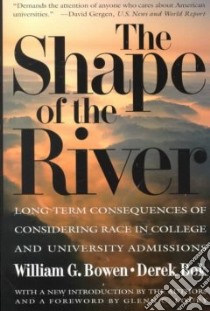The Shape of the River - 9780691050195
Un libro in lingua di Bowen William G. Bok Derek Curtis Loury Glenn C. (FRW) edito da Princeton Univ Pr, 2000
- € 32.70
- Il prezzo è variabile in funzione del cambio della valuta d’origine
This is the book that has forever changed the debate on affirmative action in America. The Shape of the River is the most far-reaching and comprehensive study of its kind. It brings a wealth of empirical evidence to bear on how race-sensitive admissions policies actually work and clearly defines the effects they have had on over 45,000 students of different races. Its conclusions mark a turning point in national discussions of affirmative action--anything less than factual evidence will no longer suffice in any serious debate of this vital question.
Glenn Loury's new foreword revisits the basic logic behind race-sensitive policies, asserting that since individuals use race to conceptualize themselves, we must be conscious of race as we try to create rules for a just society. Loury underscores the need for confronting opinion with fact so we can better see the distinction between the "morality of color-blindness" and the "morality of racial justice."
Across the country, in courts, classrooms, and the media, Americans are deeply divided over the use of race in admitting students to universities. Yet until now the debate over race and admissions has consisted mainly of clashing opinions, uninformed by hard evidence. This work, written by two of the country's most respected academic leaders, intends to change that. It brings a wealth of empirical evidence to bear on how race-sensitive admissions policies actually work and what effects they have on students of different races.
The authors are the economist William G. Bowen, President of The Andrew W. Mellon Foundation and former President of Princeton University, and Derek Bok, former President of Harvard University and former Dean of the Harvard Law School. Bowen and Bok argue that we can pass an informed judgment on the wisdom of race-sensitive admissions only if we understand in detail the college careers and the subsequent lives of students-or, to use a metaphor they take from Mark Twain, if we learn the shape of the entire river. The heart of the book is thus an unprecedented study of the academic, employment, and personal histories of more than 45,000 students of all races who attended academically selective universities between the 1970s and the early 1990s.
The study reveals how much race-sensitive admissions increase the likelihood that blacks will be admitted to selective universities and demonstrates what effect the termination of these policies would have on the number of minority students at different kinds of selective institutions. The authors go on to determine how well black students have performed academically in comparison to their white classmates, what success they have had in their subsequent careers, and how actively they have participated in civic and community affairs. The authors also explore the views expressed by graduates of selective colleges about the value of their education and the contributions that a diverse student body has made to their capacity to live and work with people of other races.
In the final chapters, Bowen and Bok relate their findings to the current debate about the wisdom of race-sensitive admissions. They consider whether critics are correct in claiming that such policies harm their intended beneficiaries by forcing minority students to compete with academically superior classmates. They examine alternative policies that have been proposed to increase diversity without relying explicitly on race in the admissions process. They end by reflecting on the thorny question of whether the concept of "merit" is compatible with a deliberate effort to achieve a racially diverse student body.
Authoritative, powerfully argued, and elegantly written, this book is a landmark work in one of the most important debates in recent American history. In the words of Harvard Law Professor Randall Kennedy, "The Shape of the River should be essential reading for anyone seeking a dependable guide thro
Informazioni bibliografiche
- Titolo del Libro in lingua: The Shape of the River
- Sottotitolo: Long-Term Consequences of Considering Race in College and University Admissions
- Lingua: English
- Autori : Bowen William G. Bok Derek Curtis Loury Glenn C. (FRW)
- Editore: Princeton Univ Pr
- Collana: Princeton Univ Pr (Paperback)
- Data di Pubblicazione: 04 Gennaio '00
- Genere: EDUCATION
- Dimensioni mm: 234 x 127 x 31
- ISBN-10: 0691050198
- EAN-13: 9780691050195


